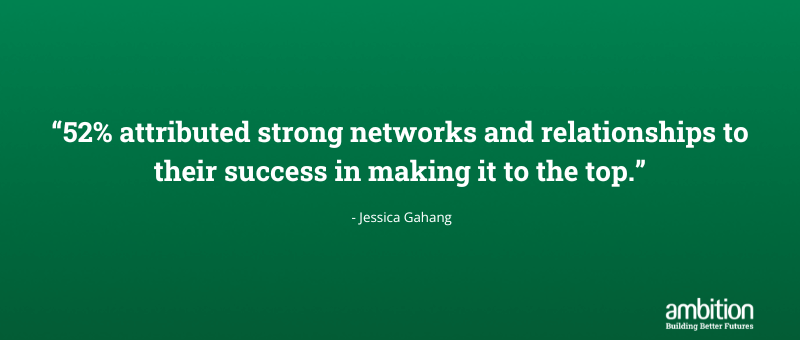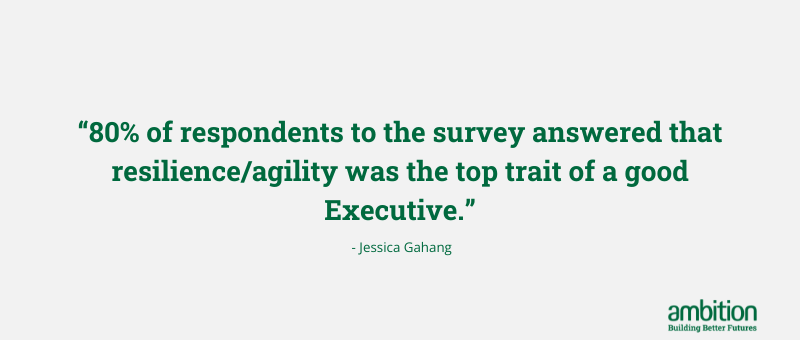Please beware of recruitment scams that are currently targeting jobseekers. Click here for further advice.

5 key strategies for advancing to executive finance leadership
Recently, Ambition hosted a senior finance event called Beyond the Numbers: A Journey to Executive Finance. The event was premised around a survey we conducted, where we asked finance executives questions about their journey to the top.
Some of the questions we asked them included, “What were the top 3 barriers in your journey to becoming an Executive?”, “What keeps you up at night?” and “What advice would you give the next generation of Executives?
We then presented our findings at the event and asked our panel of guest CFOs to provide insights on the trends we identified, based on their personal experiences. Our panel was made up of Liz Blockley (CFO of MaxiParts), Karen O’Duil (CFO of Oxfam), Simon Beckett (CFO of Fuchs) and Donna Burr (Partner at Watermark Search International).
Reflecting on the survey results and our panellists’ responses, I’d like to share some recurring themes. Here are my 5 key takeaways on how to successfully transition to the executive level.
Quick links
1. Networking is king
23% of execs said they wished they had known the importance of networking and relationships prior to making it to the top, and conversely, 52% attributed strong networks and relationships to their success in making it to the top.
I learned from our panelists that networking isn’t just external (e.g. attending networking events or connecting with peers on LinkedIn). In fact, most networking occurs internally and can include a broad range of activities such as joining work clubs and committees, taking on project work, or simply reaching out to your colleague for a coffee.
Networking will help you to be the first person your boss thinks of poaching when they move to a new business, or the first person the CFO thinks of when a new finance project is approved. The goal is to be the ‘go-to’ finance person in the business, and you can’t be that person unless people know who you are and what you do!
Truth bomb: No one is responsible for your career development except for you, so being able to build relationships early in your career can open the door to many opportunities for you in future.

2. Success is a team sport
Seven respondents to our survey said the advice they would impart on the next generation of Execs would be to, “invest in your team” and “surround yourself with good people.” In a similar vein, 44% of respondents thought that being able to empower one’s team was the 5th most important trait of a good Executive.
As you climb the ladder, it’s apparent that your time should increasingly be spent focussing on the bigger picture and your team should handle everything else. It’s a symbiotic relationship – their success will support your success and vice versa. To that end, building a team you can trust is critical to your success in an executive role.
To build a strong team, you need a happy team. Here are some of the ways our panelists suggested going about this;
Celebrating small wins to ensure your team feels as though they have purpose and that they’re adding value.
Investing in upskilling and re-training employees so they feel like they remain relevant.
Continuing to ask whether the work allows employees to fulfil their ‘why’.
Ensuring the business continues to deliver on its employee value proposition.
Listening more than talking.
One panellist also mentioned that much like consumer products are tailored to individuals, there’s an expectation that managers tailor the management of their staff to their individual wants and needs. An ability to successfully execute this is a sure-fire way to ensure your staff are happy and ultimately, stick around. You need them more than they need you!
3. Resilience keeps you standing, agility keeps you dancing
80% of respondents to the survey answered that resilience/agility was the number one top trait of a good Executive. What does this mean in the context of a CFO role?
What I took away from our panellists’ answers is that resilience for a CFO is being brave enough to re-tackle an issue when you couldn’t solve it the first time and being able to recover from problems and setbacks with minimal impact to the business. In my view, it’s also about positioning the business to withstand different market conditions and investing in its people to become more resilient. In other words, a CFO needs resilience to keep the business ticking over.
Agility is the ability to adapt to unexpected events and respond decisively. Now more than ever, CFOs are required to make decisions where there is incomplete information, pivot where market conditions have changed, take accountability for these decisions and use data to identify skills gaps and allocate talent to fill these gaps. Whilst a resilient CFO keeps a business ticking over, a resilient and agile CFO will help a business to thrive.

4. It’s OK to not be the expert on everything
Imposter syndrome is real – we all feel it! Even CFOs. One of our panelists, Simon Beckett, a newly appointed CFO, confirmed that he still has no idea what he’s doing, but that he’s comfortable with this because he’s surrounded by people who are experts in what they do. Simon continued by saying that even though he has no idea, he is genuinely curious and is asking many, many questions so he can understand the business.
Ironically, acknowledging that you don’t have all the answers is exactly what makes you a good CFO – knowing you don’t have the answers means you’re empowering “The wisdom and collective intelligence of the organisation, the “system”to grow and evolve. Because it’s the system – the people we work with, who work for us, the organisation as a while – that actually does know.”

5. Nuggets of gold
Finally, here are some little nuggets of gold, direct from our panelists –
You’re going to have to put in the hard yards – unfortunately, the reality is that you’re going to have to go above and beyond your BAU to show you have what it takes
Whilst it is ideal to work under good leaders to learn healthy leadership behaviours, working with bad ones can be an equally valuable learning experience.
Back yourself – you’re your biggest believer and the captain of your career ship – back yourself to do the job and success will come your way
Looking for more advice?
Listen to our podcast Career Insights with Ambition for further insights from C-Suite leaders in the Finance & Technology space who share their career journeys and their advice for aspiring leaders.
In summary
The journey to executive finance leadership is shaped by a blend of personal resilience, strategic networking, team investment, and a willingness to embrace both strengths and limitations. Our survey and panelists highlighted that while the path can be challenging, those who focus on relationship-building, adaptability, and empowering their teams will not only reach the top but also create lasting impacts in their organisations. For finance professionals aspiring to advance, these insights offer a valuable roadmap.
You can find the full results of our survey by scanning the QR code below.

If you’re ready to take the next step in your career, join us at future Ambition events for more inspiration and guidance. Get in touch with our team of consultants to express your interest via the form below.
Author Jessica Gahang has been recruiting senior commercial finance and accounting roles in the Melbourne market since 2022. Before Jessica's recruitment career, she worked at a large accounting firm as a State Taxes Adviser to some of Victoria’s largest property and development clients for six years.
Edited by Melanie Brown, Marketing Executive, Ambition Group Australia.






